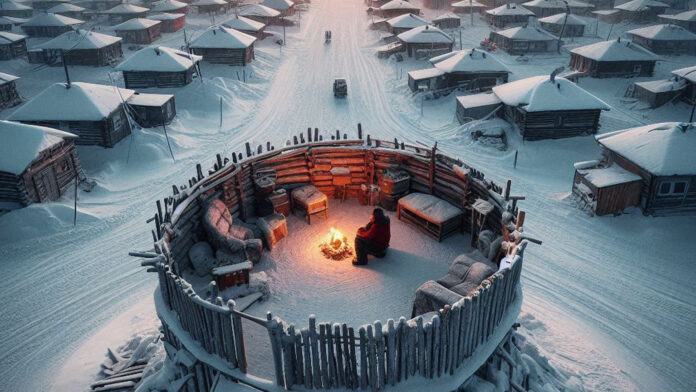Yakutsk, located deep in the heart of Siberia, is enveloped in ice and fog, with winter temperatures down below -40°F (-40°C). Yakutsk, the capital of Russia’s Sakha Republic (commonly known as Yakutia), is one of the world’s coldest inhabited areas. Living in such a harsh climate requires special challenges and adaptations. This essay looks at living in Yakutsk, where the temperature rarely rises above freezing and the air is crisp with the stinging cold of the Arctic.
Climate and Environment
Yakutsk has a subarctic climate that includes long, hard winters and brief, moderate summers. Winter temperatures typically hover around -30°F (-34°C), but can drop as low as -58°F (-50°C). The city is covered in snow and ice for much of the year, and the ground is frequently frozen solid due to permafrost. Summers, albeit brief, can be quite warm, with temperatures occasionally reaching 90°F (32°C).
Daily Life and Adaptation
Clothing: Yakutsk residents have mastered the skill of dressing for extreme cold. Layering is important, including thermal pants, thick woollen sweaters and hefty down coats. Fur hats, mittens, and boots are popular because they give the finest protection against the piercing cold.
Heating and Infrastructure: Yakutsk buildings are designed to resist freezing temperatures, with thick insulation and centralised heating systems. Homes, schools, and offices are frequently connected to district heating plants, which offer a consistent supply of heat. Water pipes are heated and insulated to avoid freezing, and many structures are built on stilts to accommodate changing permafrost.
Transportation: Vehicles in Yakutsk require unique modifications to operate in the harsh cold. Engine block heaters are routinely used to prevent engines from freezing, and many locals utilise insulated car covers. Public transit, like as buses, runs throughout the winter, with schedules tailored to the hard conditions.
Food and Cuisine: The local diet is geared to the harsh climate, with an emphasis on hearty, high-calorie dishes. Traditional foods frequently contain meat, fish, and dairy components. A typical local delicacy is “stroganina,” which is thinly sliced raw fish or pork served frozen. Reindeer, horse, and fish are staples that provide vital nutrients and energy for surviving the cold.
Social Life and Culture: Despite the severe surroundings, Yakutsk boasts an active cultural scene. The city is home to theatres, museums, and festivals that honour the distinctive legacy of the Sakha people and other indigenous tribes. Winter festivities, such as the Cold Pole Festival, feature traditional music, dance, and ice sculpture competitions.
Healthcare and Wellbeing: The frigid temperature presents unique health challenges, such as frostbite and hypothermia. Local healthcare services are well-equipped to deal with these illnesses, offering specialised treatments and prevention measures. Residents are also accustomed to making extra efforts to be warm and protect their skin from the cold.
Beauty of Yakutsk
While life in Yakutsk might be difficult, the city also boasts stunning natural beauty and opportunity for adventure. The winter scenery, with its enormous fields of snow and ice, is stunning. The neighbouring Lena Pillars, a UNESCO World Heritage site, are breathtaking natural rock formations that emerge sharply from the frozen ground.
Conclusion
Living in Yakutsk, one of the world’s coldest cities, demands resilience, flexibility, and a strong feeling of community. The harsh climate influences all aspects of living, from clothing and food to transportation and social activities. Despite these obstacles, the people of Yakutsk have devised inventive ways to not only survive but prosper in their frigid environment. The city’s rich culture, breathtaking natural beauty, and unwavering character make it an exceptional location to live.






Wonderful web site Lots of useful info here Im sending it to a few friends ans additionally sharing in delicious And obviously thanks to your effort
you are truly a just right webmaster The site loading speed is incredible It kind of feels that youre doing any distinctive trick In addition The contents are masterwork you have done a great activity in this matter